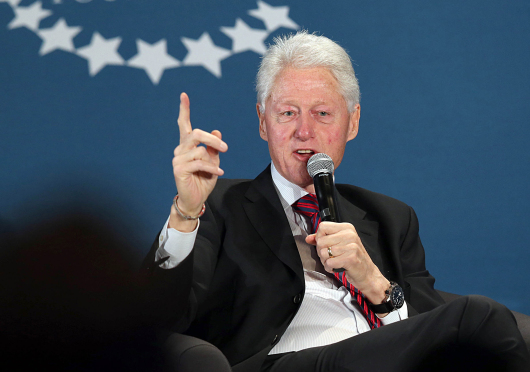
President Bill Clinton talks during the opening session of the Clinton Foundation’s Future of the Americas event at the University of Miami on Thursday, Dec. 11, 2014 in Miami. Credit: Courtesy of TNS
From plans for remedying water shortages to figuring out how to prevent insect-transmitted diseases, 19 Ohio State students have started drafting proposals to share at the annual Clinton Global Initiative University meeting in Coral Gables, Fla.
One of the students selected from OSU is Kevin Inks, a third-year in economics and geography who is working on a project that would install a sky hydrant — a high-volume, high-quality, chemical-free filter that helps with accessibility to clean water — in a community called El Cortez, El Salvador. Inks said he also is proposing to build a school there.
Inks and the other students were selected to travel to the University of Miami from March 6-8 to further develop their Commitment to Action proposals, which are initiatives that address pressing challenges on campus, in local communities or around the world. The students will be asked to present these projects at the CGI U meeting.
“I think part of the reason why we got selected was because we are doing innovative things,” Inks said. “We are partnering with researchers at Penn State to come up with a way to design filters. Really, really good filters out of moringa seeds.”
Right now, Inks said the testing filters are biosand water filters, but he hopes to expand the test to filters made from moringas, which are found in the region. He said these filters would allow the people of the community to source the material locally to build their own seed filters to keep water clean.
Inks and his two partners are representing Pure Water Access Project, which is a Columbus nonprofit, where they hold fellowship positions within the organization. The organization aims to end the crises of polluted water and non-accessible water sources through research and partnership with local organizations, Inks said.
Inks said he and his team are currently at the test phase with the project.
“It’s looking really good so far, but hopefully with a little more research and a little more data, we can start using these moringa filters in a wide scale,” Inks said.
The CGI U meeting, which is in its eighth year and was launched by former President Bill Clinton in 2007, will bring together more than 1,000 students from around the country to discuss global solutions in one of CGI U’s five focus areas that include education, environment and climate change, peace and human rights, poverty alleviation and public health, according to the CGI U website.
This will be Inks’ first trip to the conference.
“It’s going to be eye-opening and a great experience,” he said.
CGI U is a feature of the Clinton Global Initiative, which is an initiative from the Clinton Foundation that was established in 2005, and has gathered more than 108 heads of state, 20 Nobel Prize laureates and hundreds of CEOs, among others, to come up with solutions to world problems, according to the CGI U website.
Wayne Carlson, the OSU vice provost for undergraduate studies and dean of undergraduate education, said when OSU students are selected to participate in the program, it shows their dedication.
“I am personally awestruck with the range of quality of these commitments,” Carlson said in an email.
In 2014, OSU had seven students attend the annual meeting in Temple, Ariz., according to the OSU Honors and Scholars website.
Another student from OSU who will attend the conference is Chelsea Bray, a second-year in neuroscience. Her Commitment to Action project is to provide education to the people of the Philippines region about dengue fever and how to prevent it.
Dengue fever is a disease spread by mosquitos, and in the more impoverished areas of the Philippines, the mortality rate is quite high since there is no cure or treatment plan in those areas, Bray said.
According to the World Health Organization Western Pacific Region website, the cumulative number of reported cases of Dengue fever in 2015 is 113,485. The cumulative number of deaths reported in 2015 is 425.
“Our educational outreach would be to teach people about keeping water clean and not letting water linger around so that mosquitos can fester in it and lay eggs,” Bray said.
Bray and her group also plan to build nets to put on doors and windows to protect mosquitos from entering homes.
Bray said her team’s goal is to network with others working on similar projects at the conference.
Clinton and his daughter, Chelsea, will host this year’s conference.


